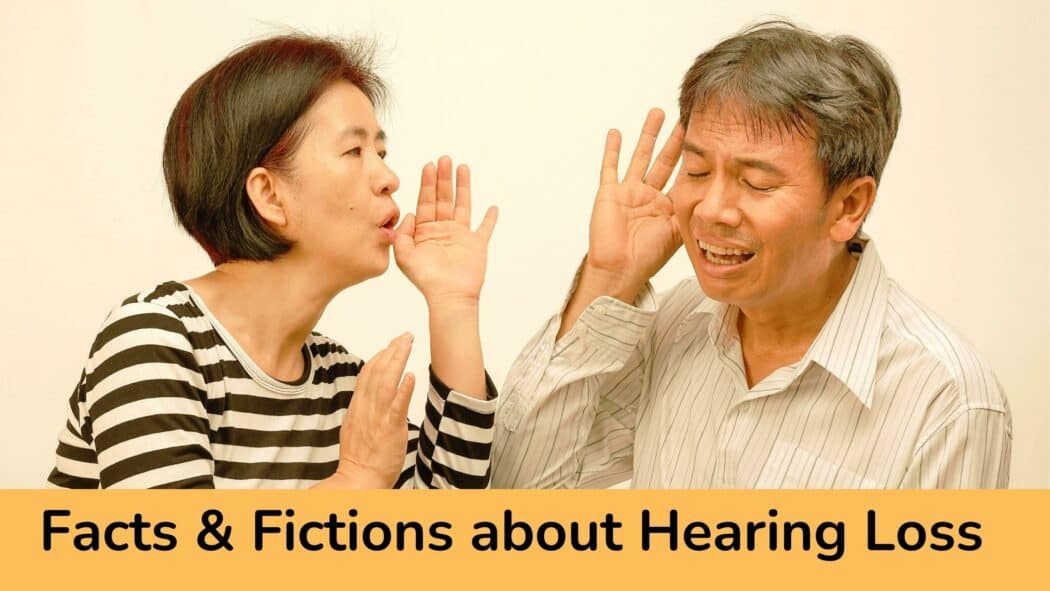Do you suspect you have a hearing loss? Are you wondering what the next steps should be? There are many misconceptions around hearing loss that can keep you from receiving the treatment you need. Understanding the differentiation between fictions and facts around hearing loss can help you make the best choice for you and your individual situation.
Fiction: Only the Elderly Have Hearing Loss
Age related hearing loss, also referred to as presbycusis is the most common cause of hearing loss. Presbycusis affects one in three people over 65 and half of those over 75. However, this does not mean you are safe from having hearing loss if you are younger. There are several factors which can damage your hearing at any point in your life, including exposure to harmful levels of noise, head trauma or infection. This is why approximately 40% of people in the US with hearing loss are under the age of 60 and nearly 30% of those between ages 50 and 59 suffer from some degree of hearing impairment in one or both ears.
Fiction: Hearing Loss Doesn’t Affect Many People
Hearing loss is the third most common chronic health condition in the US, more common than diabetes or cancer. It affects around 48 million people (20% of the population) in the US and 466 million worldwide. It is projected that in the next 30 years that number will grow to 700 million.
Fiction: Sign Language is the Best Way to Communicate with the Hearing Impaired
American Signs Language (ASL) is a language developed in the US developed and used by deaf people. Hearing loss develops slowly over time and only diminishes certain tones or pitches. This means that it is still possible to hear, but just frustrating. It may be useful for a person with a hearing impairment to rely on body language, lip reading or facial expression, but learning ASL takes study, focus and time just as any other new language.
Fiction: Your Hearing Loss was Caused by Rock Concerts
May you look back on that concert you went to years ago, or a stadium sporting event or night club. You may catch yourself asking: “was it worth it?” Don’t be too hard on yourself. It is always a good idea to wear hearing protection when you are around loud noise but unless the sound is exceedingly loud it takes time for hearing damage to occur. This is why presbycusis is the most common form of hearing loss. Other aspects that can damage hearing include genetics, medications, smoking, poor nutrition, hypertension, cardiovascular disease, osteoporosis, and diabetes. There are many things which can cause hearing loss but most lead to damage to tiny hair-like cells of the inner ear. These tiny cells are called stereocilia, which transmit gathered sound to the brain. When these become damaged over time, they cannot send the complete audio signal to the brain, causing permanent hearing loss.
Fiction: If You Can Hear Some Sounds – You Should Wait
You may still be able to follow conversations but over time this will become more and more difficult. Even so, studies have examined brain images and found that even a mild hearing loss can cause parts of the brain to shrink. Many believe that this can increase the risk of cognitive decline and the onset of dementia. The sooner you treat your hearing loss, the more you can reduce your chances of serious cognitive issues later on.
Fiction: I Can’t Handle All that Technology
The most common treatment for hearing loss is hearing aids. These tiny devices sit behind the ear and act as tiny computers, processing sound and amplifying the specific sounds you struggle to hear due to your impairment. While this does sound impressive, the beauty of new technology in hearing aids is that it is very user friendly. Many new hearing aids, suppress background noise so you can hear in crowds, connect wirelessly to your smartphone via Bluetooth, and can even be programmed remotely, so you can skip in person visits to our office. The more you learn about what new hearing aids can offer the more impressed we guarantee you will be. To find out more, set up a hearing exam today. we can get you on the road to healthy hearing in just a little time.

